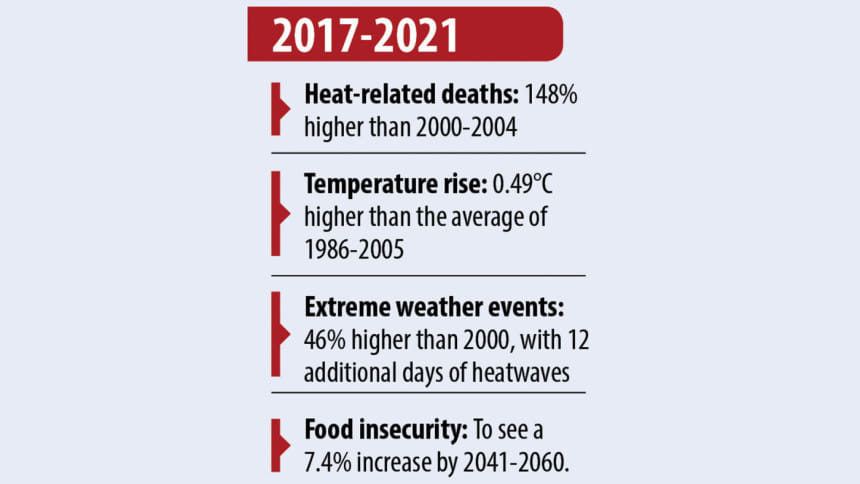Heatwave In Bangladesh: Older people bear the brunt

Around 1,430 people, aged 65 and up, have died between 2017 and 2021 from heat-related causes, which have accelerated due to climate change, said a study revealed yesterday.
The number is a whopping 148 percent higher than what it was between 2000 and 2004.
Titled "Impacts of climate change on health in Bangladesh", the study was conducted by the Grantham Research Institute on Climate Change of London School of Economics (LSE) and the Environment and Centre for Climate Change Economics.
According to the study, the health risk to millions of people has been on the rise in Bangladesh due to the impact of climate change.
It said the summer of 2021 experienced a 0.49 percent rise in temperature compared to 1986-2005. Consequently, the number of days experiencing heatwaves has increased by 12 days, leading to higher heat-related deaths.

"Vulnerable people, including the young and the elderly people and those with health issues, suffer significantly during extreme heat and heatwaves," the report said.
Apart from heatwaves, other effects of climate change – droughts, floods, and cyclones – have been destroying land and damaging health facilities, and negatively impacting food, nutrition and livelihoods, further increasing the risk to public health in the country.
The study said food insecurity in Bangladesh is expected to increase by 7.4 percent by 2041-2060.
Moreover, disease vectors have been on the rise due to climate change impact, which was evident in the 2022-23 dengue outbreak linked to high rainfall and temperature in the capital.
According to the study, dengue outbreaks are expected to worsen due to favourable climate conditions for the mosquito population in the country.
The report, authored by Lauren O'Leary, Shouro Dasgupta, and Prof Elizabeth JZ Robinson, highlighted a 46 percent increase in extreme weather events in Bangladesh since the year 2000.
It said there was an average of 1.7 months of drought in the 2012-2021 period, whereas from 1951-1960, the average was 0.3 months.
Dasgupta, visiting senior fellow of Grantham Research Institute, said, "Climate change threatens to reverse decades of Bangladesh's remarkable progress in public health, especially in child and maternal healthcare."
The report also mentioned that Bangladesh, consistently ranked among the worst countries with air pollution, sees high mortality rates due to respiratory infections, lung cancer, and other cardiovascular diseases.
As air quality is poor in rural and urban areas, the death toll from air pollution was 1,01,500 in 2019 and 1,12,700 the following year, the report said.
It added, "24,000 people in the Dhaka region alone were estimated to have died prematurely due to air pollution in 13 years between 2005 and 2018."
Additionally, women and children are more likely to be exposed to indoor air pollution because only 23 percent of the population has access to clean cooking fuels.
Asked, Ahmad Kamruzzaman Majumder, chairman of the environmental science department at Stamford University Bangladesh and Center for Atmospheric Pollution Studies, said, "While the intensity and extent of heatwaves are increasing, the use of fossil fuels is accelerating both the rise in temperature and air pollution, creating multifaceted risks for public health."
Additionally, climate change is also impacting mental health, contributing to conditions like anxiety and depression.
Prof Iqbal Kabir, director of Climate Change and Health Promotion Unit of the health ministry, said, "Climate change is a big public health crisis for Bangladesh.
"It's crucial that we swiftly implement policies to pave the way for a low-carbon emitting, resilient nation and protect the well-being of our people today and in the future."

 For all latest news, follow The Daily Star's Google News channel.
For all latest news, follow The Daily Star's Google News channel. 




Comments